mercredi 29 août 2007
Marhaba!
Par dave, mercredi 29 août 2007 à 19:38 :: Iran
I left Iran about two weeks ago, spent a few days in Turkey with a french photographer I had met in Istambul more than a month before, and am now in Damascus, Syria. Iran proved to be interesting in the end, if extremely strange in many regards. I was indeed lucky enough to meet a professor of english litterature at my hotel in Iran, with whom I had many a conversation in english (at last) about politics, which is a topic most iranians (if not all) are well versed in : there are at least three or four prime time TV programmes about politics every week, in which each and every subject related to Iran (nuclear power, foreign affairs, the way Iran is seen in the west complete with excerpts from western media, be they BBC, CNN or USA today) is dissected.
J'ai quitte l'Iran il y a de cela environ deux semaines, passe quelques jours dans le sud de la Turquie avec un photographe
francais rencontre a Istambul plus d'un mois auparavant, et me trouve a present a Damas, en Syrie. L'Iran s'est averee tres
interessante au final, mais plutot etrange par beaucoup d'aspects. J'ai en effet eu la chance de rencontrer un professeur de
litterature anglaise a mon hotel, avec qui j'ai pu discuter (enfin) de tout et de rien mais surtout de politique, qui est un
sujet que la plupart des iraniens connaissent tres bien : il y a au moins trois ou quatre emissions politiques par semaine,
dans lesquelles tous les themes lies a l'Iran (nucleaire, affaires etrangeres, vision de l'Iran a l'etranger avec extraits de
la BBC, CNN ou USA today) sont abordes.
The general impression I have now is that of a completely schizophrenic country : on the one hand, an extremely tough and brutal government which is hated by many -"they kill you easily here" said the professor-, with censorship and closing of newspapers, attempted censorship of the internet, basically censorship of everything under the sun, all in complete opposition to the apparent mindset of the Iranis. On the other hand, many Iranis do have internet access at home and manage to bypass the filters set by the government, do watch political programmes, and do have satellite dishes which, although technically illegal, are actually tolerated. It's very difficult to understand how such a regime can hold, unless you take into account the professor's aforementioned remark. On a side note, the many internet cafes that can be found in iranian cities are not for the internet itself but are actually socializing places for boys and girls.
L'impression generale que j'ai a present est celle d'un pays completement schizophrene : D'une part, on trouve un gouvernement dur et repressif, qui est deteste par beaucoup -"ici, ils te tuent facilement" m'a dit le professeur, avec censure et fermeture des journaux, du net, et de tout ce qui se trouve sous le soleil, en opposition complete avec l'etat d'esprit apparent de la majorite des iraniens. D'autre part, beaucoup d'iraniens ont un acces au net a la maison et parviennent a contourner les filtres mis en place par le gouvernement, regardent les emissions politiques, et ont des antennes satellites qui sont techniquement illegales mais tolerees. Une note a propos des cafes internets (qui ne servent a rien puisque les iraniens ont le net a la maison) : ce sont des endroits de rencontres pour garcons et filles.
On top of that, as I said before - in french, sorry guys, I was being lazy - Iran is surprisingly rich and developped. Not many countries can boast a sign language interpreter on every TV news programme, who happens to be a woman, in spite of all the prejudices against Iran.
A ceci s'ajoute le fait que l'Iran est un pays etonnamment riche et developpe. Peu de pays peuvent se vanter d'avoir un interprete en langage sourd muet pour tous les journaux televises, qui plus est femme, en depit ici de tous les prejuges sur l'Iran.
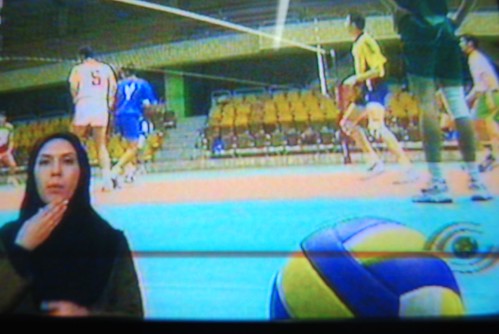
Back to politics, my professor had many questions for me on french foreign policy, on the situation of arabs in French society - they happen to be hated and despised in Iran because they supposedly destroyed persian culture 1400 years ago-. The conversation then focused on the iranian nuclear programme : why doesn't the west want Iran to have nuclear capabilities? The general belief over there seems to be that, as someone told me while giving be one of the new 50000 Rials (5 dollars) banknotes on which an atomic symbol can be seen, "it is our right".
Si l'on revient a la politique, mon professeur avait de nombreuses questions au sujet de la politique etrangere francaise, sur la situation des arabes dans la societe francaise -ils sont detestes et meprises en Iran puisqu'ils sont censes avoir detruit la culture persane il y a 1400 ans-. La conversation s'est ensuite tournee sur le programme nucleaire iranien : pourquoi l'Ouest ne veut-il pas que l'Iran se dote d'un programme nucleaire? La pensee generale semble etre ce que m'a dit le receptionniste de l'hotel en me tendant un des nouveaux billets de 50000 Rials (5 Dollars) sur lequel on pouvait un symbole atomique : "C'est notre droit".
I have also met another side of foreign affairs while travelling in Iran (and Syria), namely the war in Iraq. Millions of Iraqis have indeed left their country in search for a better life of more simply for a job, and many are now in Syria and Iran. They have all told me the same story : before, Saddam Hussein killed maybe 10 people a day. Now, the war is killing hundreds every day and most of them long for the "good old days". They often describe the situation as "there is no life there" : no water (you have to buy bottles), no hospitals (I met two Iraqi brothers taking their son to a hospital in Damascus), no jobs, no nothing. One man in particular, in Esfahan, was particularly distraught : he had left his 3 year old son and his wife in Bassorah, because an Iranian man who spoke arabic had told him that if he came to Esfahan, he would give him a job. The problem was, when the Iraqi tried to call the Iranian in Esfahan, he couldn't get hold of him, and was on the verge of tears. I have rarely seen such despair in a man and it was a heartwrenching sight.
J'ai egalement rencontre un autre aspect de la politique etrangere en voyageant en Iran (et en Syrie), a savoir la guerre en Irak. En effet, des millions d'irakiens ont quitte leur pays a la recherche d'un avenir meilleur, ou tout simplement pour trouver du travail, et beaucoup d'entre eux sont maintenant en Syrie et en Iran. Ils me racontent tous la meme histoire : avant, Saddam Hussein tuait peut etre 10 personnes par jour. Maintenant, la guerre tue des centaines de gens tous les jour, et la plupart d'entre eux revent de "comme avant". Ils decrivent souvent la situation comme "aucune vie n'est possible la bas" : pas d'eau (il faut acheter des bouteilles), pas d'hopitaux, pas de travail, rien. Un homme en particulier, a Ispahan, etait particulierement affole : il venait de quitter son fils de trois ans et sa femme a Bassorah, parce qu'un Iranien qui parlait arabe lui avait dit qu'il lui donnerait du travail si il venait a Isfahan. Le probleme etait qu'il n'arrivait pas a le joindre et avait l'air au bord des larmes. J'ai rarement vu tel desespoir chez quelqu'un.
The last few days in Iran were spent with Aurelie, a french girl I had met before in Istambul then again at the border, in Sanandaj, the capital of Iranian Kurdistan. As usual, the people were extraordinarily friendly and hospitable : where else would you see a man take you to the bus station in a taxi, help you buy the ticket, take you back to the city center (taxi again) and then pay for everything?
Les derniers jours ont ete passes en compagnie d'Aurelie, francaise rencontree a Istambul puis re-rencontree a la frontiere, a Sanandaj, capitale du Kurdistan iranien. Comme d'habitude, les gens etaient particulierement amicaux et hospitaliers : ou ailleurs peut on voir un homme vous emmener en taxi a la station de bus, aller acheter le billet avec vous, puis vous rembarquer en centre ville avant de payer pour tout?
As to Syria, I have been there for almost a week. I arrived in Aleppo after crossing an apparently little used border crossing where they seemed quite surprised to see me. After a bit of chit-chat in stumbling arabic, their asking whether I was originally from the area because of my face -many people here assume that I'm an arab although my skin is chalky white-, and their checking that I was neither a photographer nor a journalist, they let me cross quite peacefully with the usual extreme friendliness syrians show to foreigners. It was also my first encounter with the local dictator, whose face is *everywhere*. The slogans can be quite interesting, I especially like (roughly translated) : "you are here for us, we are with you, for you are us"
En ce qui concerne la Syrie, j'y suis depuis environ une semaine. Je suis arrive a Alep apres avoir traverse un poste frontiere peu usite, sauf par les routiers, ou ils semblaient plutot etonnes de me voir. Apres quelques minutes de discussion dans mon arabe plus que douteux, quelques questions sur mon metier (prof? tout va bien) et sur pourquoi j'ai une tete d'arabe et donc si je suis du coin, ceci malgre ma peau d'un superbe blanc craie (oui), ils m'ont laisse passer et ont fait preuve de l'habituelle extreme gentillesse syrienne vis-a-vis des etrangers. J'en ai egalement profite pour faire la connaissance du dictateur local - il est partout- et de ses slogans assez fun (traduction douteuse): "tu es la pour nous, nous sommes avec toi, car tu es nous".
Aleppo was some kind of childhood dream to me, since I had seen a documentary on the city on television. It did not disappoint me in the least : gorgeous Souq (empty on the picture) and old city, the lingering smell of coffee laced with cardamome, all complete with the boyishly perfect Citadel atop a hill. The people in Aleppo (or Haleb as they call it) were unbelievably welcoming, always ready to help and to have you drink gallons of tea.
Alep etait pour moi une sorte de reve d'enfance (non, pas a cause du savon), depuis que j'avais vu un documentaire sur la ville a la television francaise. Je n'ai pas ete decu : Souq (vide sur la photo, c'est pas tres courant) et vieille ville superbes, l'odeur du cafe melange a la cardamone, le tout domine par la citadelle sur la colline. Les gens d'Alep (ou d'Haleb comme ils l'appellent) etaient incroyablement accueillant, toujours prets a aider, discuter, et a vous faire boire des hectolitres de the.
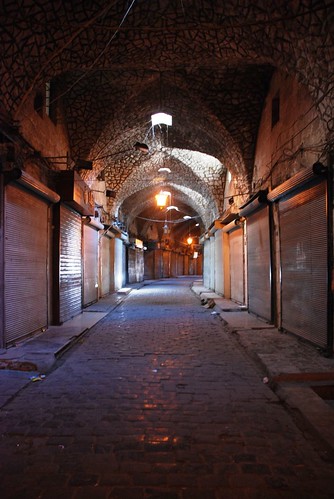
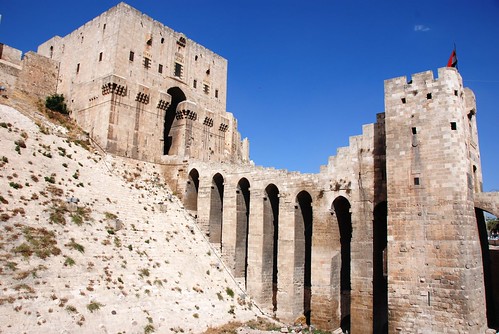
I then met charming and funny Gabrielle, multilingual french girl with whom I spent the next few days and went to Damascus. To avoid giving lengthy explanations as to why we were travelling alone (strange over there) but together (even stranger, especially for her) and not married, we decided that she'd be my fiance, which somehow spiralled out of control a few times, since I was supposed to answer for her *and* be coherent . I won't do it again : it is both complicated and disrespectful. But oi! If they could stop asking those personal questions! We used one day in Aleppo to visit the St Simeon Basilica, about 40 km outside of town. It really is in the middle of nowhere, and happens to be extremely beautiful (I'm afraid those bad pictures don't do it justice).
J'ai ensuite rencontre la charmante Gabrielle, francaise multilingue avec qui j'ai passe les jours suivants et suis alle a Damas. Pour ne pas avoir a donner des explications incomprehensibles sur pourquoi on voyageait chacun seul (c'est bizarre la bas) mais la on etait deux et pas marie (ca aussi c'est bizarre, en particulier pour elle), elle est devenue ma fiancee. C'est evidemment parti en vrille une fois ou deux puisque j'etais cense repondre pour elle *et* etre coherent. Je ne le referai pas : c'est complique et surtout c'est un manque de respect. On a egalement passe une journee a la Basilique St Simeon, 40km a l'exterieur de la ville, au milieu de nulle part. C'est superbe, et les photos ne lui rendent pas justice.
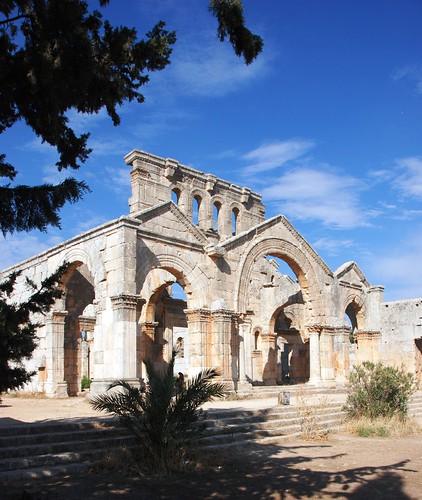


As to Damascus, it is a city of staggering beauty : be it the old city or the new city, everything here is suffused with some kind of eastern spirit. As to the pictures, this all I have at the moment :-(
Quant a Damas, la ville est d'une beaute a couper le souffle. Que ce soit la vieille ville ou la nouvelle ville, Damas est un peu l'orient dont vous avez toujours reve... Quant aux photos, c'est tout ce dont je dispose pour l'instant :-(
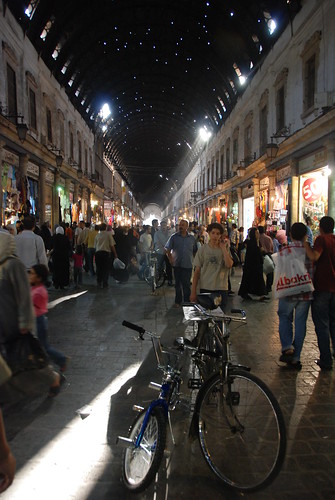
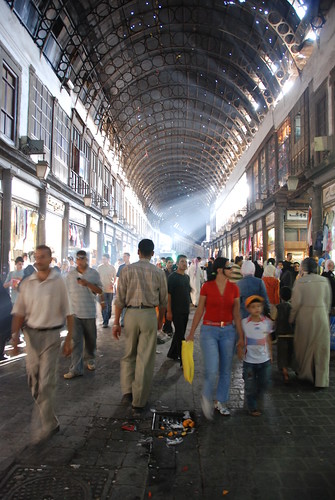
What's coming? Syria, more Syria. I just love it, and being able to butcher arabic -I understand it a lot more than I speak
it- makes all the difference.
La suite des operations? Rester en Syrie. J'adore le pays, et arriver a massacrer la langue arabe -je le comprends plus que
je ne le parle- fait toute la difference.